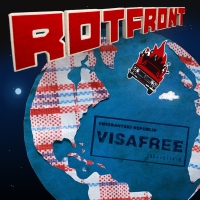This blog is a definite internet guide to Extra Estrada, WORLD, ELECTRONIC, LIVE, COLLABORATION
Monday 23 April 2012
Thursday 19 April 2012
RotFront - From Berlinstan to Babylon Tour 2012
Rotfront
From Berlinstan to Babylon Tour 2012
19.04 F - Paris / Caberet SauvageFrom Berlinstan to Babylon Tour 2012
20.04 D - Cologne / Geschlossene Veranstaltung
30.04 D - Leipzig / Courage
04.05 D - Berlin / Volksbühne
25.05 D - Mützingen / Mützingenta Festival
01.06 D - Bielefeld /Forum
15.06 D - Potsdam / FHP Campus Festival
23.06 NL - Limburg / Parkcity Live Festival
28.06 D - Lärz / Fusion Festival
30.06 D - Weißenberg / Rockbahnhoffestival
07.07 D - Flensburg / Sommerfestival
13.07 D - München / Ampere
14.07 CH - Riniken / Free for Peace Festival
12.08 HU - Budapest / Sziget
24.08 ROM - Peninsula / Felsziget
01.09 D - Frankfurt / Das Bett
16.09 RU - Moskau / Festival "Deutschlandjahr in Russland"
29.09 RU - St.Petersburg / Festival "Deutschlandjahr in Russland"
26.10 D - Berlin /Lido
10.11 CH - Wil / Gare de Lion
17.11 D - Eltville / KUZ
23.11 D - Wuppertal / Die Börse
http://www.essayrecordings.com/dates_rotfront.htm
Wednesday 18 April 2012
Tuesday 17 April 2012
ПЕРКАЛАБА - Задорно как Воплi Вiдоплясова, шумно как Gogol Bordello
ГУЦУЛЬСКИЙ СКА-ЭТНО-ПАНК
 "...На родных украинских просторах, следует отметить отличную формацию "Перкалаба". Это - гуцульский "АукцЫон"! Та же замечательная духовая секция, колоритный вокалист, который, продолжая аналогию с "АукцЫоном", успешно сочетает в себе лучшие черты Гаркуши и Федорова (и перформанс, и, собственно, "музыкальное оформление"), хорошее чувство юмора и бесшабашный неподдельный драйв!"
"...На родных украинских просторах, следует отметить отличную формацию "Перкалаба". Это - гуцульский "АукцЫон"! Та же замечательная духовая секция, колоритный вокалист, который, продолжая аналогию с "АукцЫоном", успешно сочетает в себе лучшие черты Гаркуши и Федорова (и перформанс, и, собственно, "музыкальное оформление"), хорошее чувство юмора и бесшабашный неподдельный драйв!"
Задорно как Воплi Вiдоплясова, шумно как Gogol Bordello
Це здорово! Це модно! Це – живо!!!
"Чего-чего, а с расколбасом тут все в порядке. Расколбаса много и даже очень. Задорно и весело." Drugaya.ru
Це здорово! Це модно! Це – живо!!!
"Чего-чего, а с расколбасом тут все в порядке. Расколбаса много и даже очень. Задорно и весело." Drugaya.ru
 "...На родных украинских просторах, следует отметить отличную формацию "Перкалаба". Это - гуцульский "АукцЫон"! Та же замечательная духовая секция, колоритный вокалист, который, продолжая аналогию с "АукцЫоном", успешно сочетает в себе лучшие черты Гаркуши и Федорова (и перформанс, и, собственно, "музыкальное оформление"), хорошее чувство юмора и бесшабашный неподдельный драйв!"
"...На родных украинских просторах, следует отметить отличную формацию "Перкалаба". Это - гуцульский "АукцЫон"! Та же замечательная духовая секция, колоритный вокалист, который, продолжая аналогию с "АукцЫоном", успешно сочетает в себе лучшие черты Гаркуши и Федорова (и перформанс, и, собственно, "музыкальное оформление"), хорошее чувство юмора и бесшабашный неподдельный драйв!" газета "Столичные новости"
Еще год назад в Москве мало кто знал про группу "Перкалаба" из украинского Ивано-Франковска. Первый раз они появились в столице в самый разгар этой их заварухи с выборами - прямо с главной киевской площади Майдане Назалежности приехали. На сцену "Китайского летчика Джао-Да" незаметно вылезло человек десять, все в оранжевом, а главный - еще и в шапке-ушанке. Стеснительно спрашивает в микрофон: "Можно?", ему из зала отвечают - можно. И тут, как писал Рэй Бредбери, "и грянул гром". Трубачи дуют, гитары бряц-бряц, барабанщик с перкуcсионистом чудеса творят, а к тому же в углу кто-то на каком-то экзотическом инструменте наяривает - не то ситары, не то цимбалы. А главный, которого, как потом выяснилось, зовут Федот, - кривляется, машет руками, и звонко горланит про "Любовi поклик Ау-Уа", Парагвай, злую тёщу и таинственную "зозулицу". Через минуту всем стало ясно, что ничего на свете лучше "Перкалабы" нету, разве что бродить с друзьями и портвейном по бульварам. Хм, отвлекся - так вот.
"Перкалаба" - это своеобразное музыкальное сообщество с своей собственной идеологией и собственным стилем. Играют они громкую, живую, бодрую, весёлую, танцевальную и обаятельную музыку, которую у нас принято звать ска-этно-панк, но перкалабцы называют ее "gutzul roots", - потому что сами они де гуцулы. гуцулы - это вроде бы такая народность, проживающая толи в закарпатье, то ли еще где - точно не знаю, потому что по географии в школе двойка. Да это и не важно - главное, что гуцулы - самые веселые и угарные чуваки в мире - балканцы, цыганцы и ману чао рядом не стояли. Рядом стояли Воплi Вiдоплясова, Gogol Bordello, да Пакава Ить - вот и представьте теперь, что за чудесная группа, эта "Перкалаба".
В прошлом году на московском лейбле Bad Taste вышел их дебютный альбом "Свято Грибiв i Форелiв". Не знаю, какие грибы они едят, но колбасит их отменно - приходите и убедитесь сами. А приходить надо 8го июля в клуб "Gogol'", что в Столешниковом переулке - концерты на этой отличной открытой площадке в самом центре города всегда удаются на славу, а уж если "Перкалаба" - то и подавно всем радость и веселье будет.
"Перкалаба" - это своеобразное музыкальное сообщество с своей собственной идеологией и собственным стилем. Играют они громкую, живую, бодрую, весёлую, танцевальную и обаятельную музыку, которую у нас принято звать ска-этно-панк, но перкалабцы называют ее "gutzul roots", - потому что сами они де гуцулы. гуцулы - это вроде бы такая народность, проживающая толи в закарпатье, то ли еще где - точно не знаю, потому что по географии в школе двойка. Да это и не важно - главное, что гуцулы - самые веселые и угарные чуваки в мире - балканцы, цыганцы и ману чао рядом не стояли. Рядом стояли Воплi Вiдоплясова, Gogol Bordello, да Пакава Ить - вот и представьте теперь, что за чудесная группа, эта "Перкалаба".
В прошлом году на московском лейбле Bad Taste вышел их дебютный альбом "Свято Грибiв i Форелiв". Не знаю, какие грибы они едят, но колбасит их отменно - приходите и убедитесь сами. А приходить надо 8го июля в клуб "Gogol'", что в Столешниковом переулке - концерты на этой отличной открытой площадке в самом центре города всегда удаются на славу, а уж если "Перкалаба" - то и подавно всем радость и веселье будет.
Rotfront – Jakobshof / Aachen
Rotfront – von Berlin nach Aachen. Im wahrsten Sinne des Wortes einmal quer durch Deutschland und jeder Meter hat sich gelohnt. Aber erst mal auf Anfang. Im Rahm der Pink Lenin Veranstaltungsreihe hatte man das Berliner Musiker Kollektiv für eine Show in Aachen gewinnen können. Die Balkan Party wurde dann auch aus der gewohnten Location, dem schnuckeligen Hotel Europa, in den Jakobshof verfrachtet, da die Band und das Publikum wohl nicht gleichzeitig in das Hotel gepasst hätten. Ein Entschluss, der ich als weise herausstellen sollte.
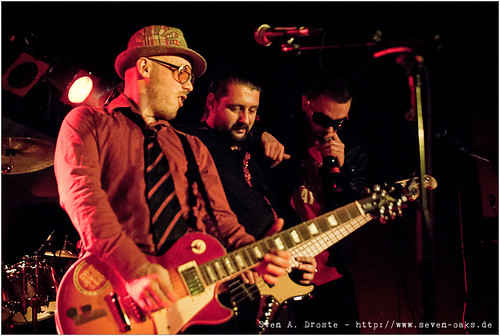
Yuriy Gurzhy, Simon Wahorn & Mad Millan / Rotfront
Es ist also Freitag, es ist der 09. März 2012. (Ja, dass ist schon etwas her, aber es hat halt etwas gedauert, bis Bilder und Bericht fertig waren. aus Gründen! Anm. d. Verfassers) Kurz vor 21.00 Uhr ist der Jakobshof bestens gefüllt, alle sind gespannt und es soll nicht mehr lange dauern bis Rotfront die Bühne okkupiert. Auf die Plätze, fertig, los! Ohne großes Vorgeplänkel, steigen die Berliner in Ihre Show ein. VisaFree * ist der erste Track auf dem aktuellen, gleichnamigen Album und auch der erste Song des Abends. Stück für Stück steigt die Begeisterung das Publikums. Und diejenigen, die behaupten, die Rotfrontler würden sich die Gunst des Publikums mit kostenlosem Alkohol erschleichen, kann man beruhigen. Die Flasche Wodka, die Mad Milian in die erste Reihe gibt, ist so schnell leer, dass die hinteren Reihen, die sich schon zur Zeit der Abgabe in Extase befinden, gar nichts davon abbekommen können.
* ist der erste Track auf dem aktuellen, gleichnamigen Album und auch der erste Song des Abends. Stück für Stück steigt die Begeisterung das Publikums. Und diejenigen, die behaupten, die Rotfrontler würden sich die Gunst des Publikums mit kostenlosem Alkohol erschleichen, kann man beruhigen. Die Flasche Wodka, die Mad Milian in die erste Reihe gibt, ist so schnell leer, dass die hinteren Reihen, die sich schon zur Zeit der Abgabe in Extase befinden, gar nichts davon abbekommen können.
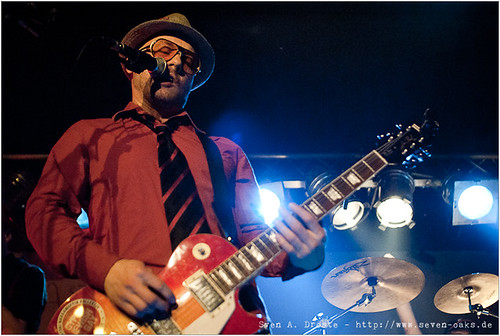
Yuriy Gurzhy / Rotfront
Die 8 Berliner, allen voran die beiden Gründer des Kollektivs, Yuriy Gurzhyund Simon Wahorn, geben alles. Sie kochen das Publikum im eigenen Saft regelrecht ab, brauchen aber auch selbst in der Mitte des Set eine kleine Pause. Wobei vermutlich alle, vor und auf der Bühne, froh sind ein wenig verschnaufen zu können, um dann in der zweiten Hälfte der Show wieder beherzt abfeiern zu können.
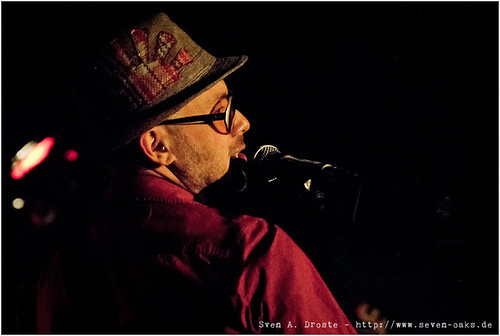
Yuriy Gurzhy / Rotfront
Der Kontakt zum Publikum ist stark bei der Rotfront. Mad Milian teilt die Massen wie einst Moses das Meer und stachelt die beiden Teile auf und lässt dann die Wall of Death los. Etwas später Surft er auf der Menge zu Theke, holt sich ein Bier und surft damit gemütlich zurück zu Bühne. Den Abschluß des zweiten Teils der Show ist ein Cover des Deichkind Klassikers Remmi Demmi. Aber auch das ist noch nicht ganz das Ende er Show. Unter lautstarken Rufen kommen Katya Tasheva, Anke Lucks, Dan Freeman, Jan Pfennig, der während der Show ein fulminantes Drummsolo hinlegte, Mad Milian, Max Bakshish, Simon Wahorn und Yuriy Gurzhy noch einmal zurück auf die Bühne und mit drei Zugaben dem Abend den Rest zu geben. So ein RotfrontKonzert ist harte Arbeit für alle. Band bzw. Kollektiv und Publikum werden bis aufs Letzte gefordert und geben alles. Ein wunderschönes Konzerterlebnis.
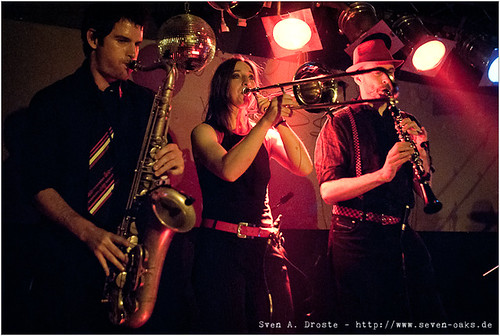
Dan Freeman, Anke Lucks & Max Bakshish / Rotfront
Die Bilder:
Der Jakobshof ist eine Location mit niedriger Bühne, ohne Graben und es war voll. Ergo, ich musste mich unter das Volk mischen und das ging während der Show mächtig ab. Das machte es nicht leichter die Show der Berliner zu Fotografieren, zumal es 8 Personen waren, die es abzulichteten galt. Alles in allem eine netter Herausforderung für mich und ein krasser Gegensatz zu Show von Rea Garvey ein paar Tage zuvor.
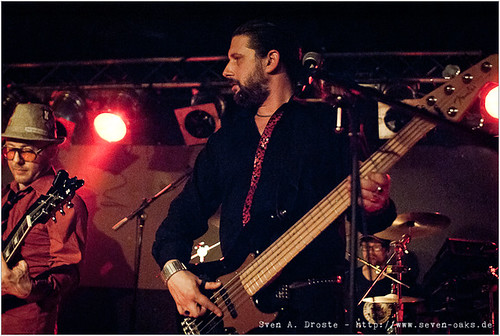
Yuriy Gurzhy & Simon Wahorn / Rotfront
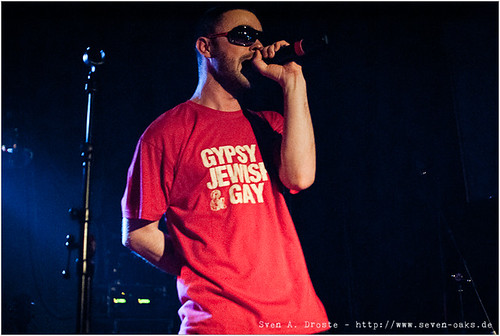
Mad Milian / Rotfront
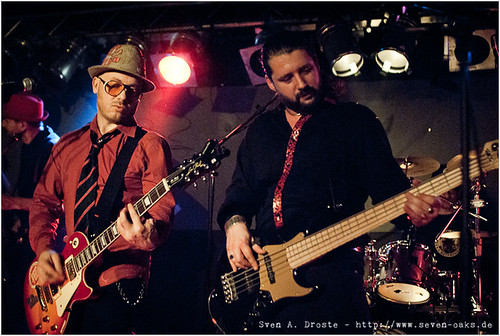
Yuriy Gurzhy & Simon Wahorn / Rotfront
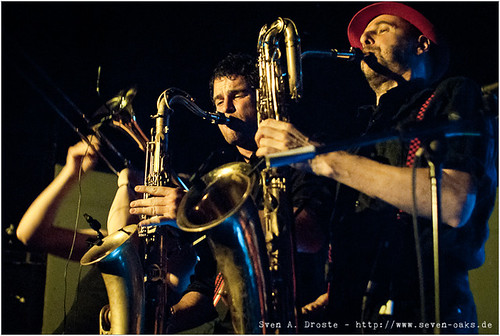
Anke Lucks, Dan Freeman & Max Bakshish / Rotfront
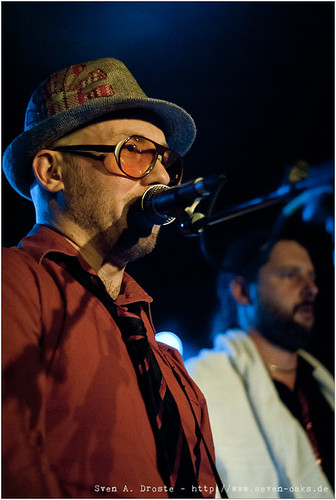
Yuriy Gurzhy & Simon Wahorn / Rotfront
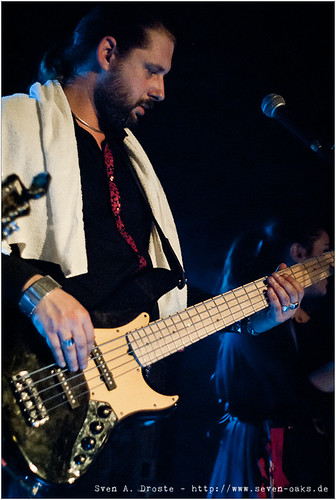
Simon Wahorn / Rotfront
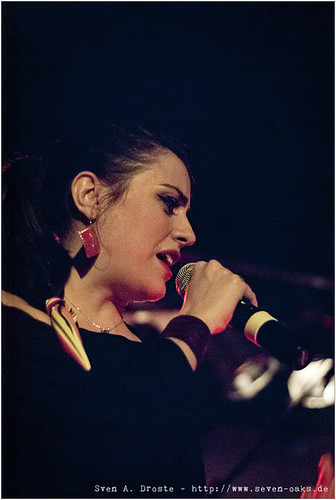
Katya Tasheva / Rotfront
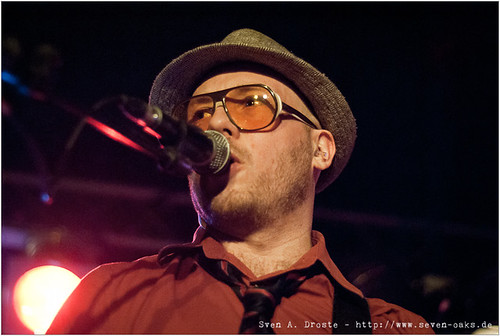
Yuriy Gurzhy / Rotfront
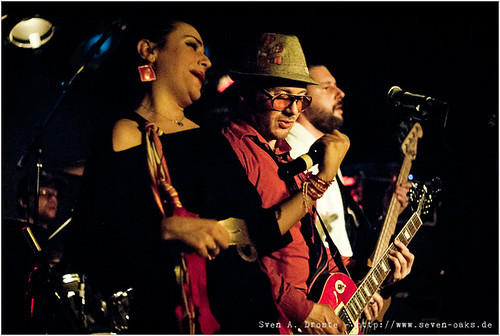
Katya Tasheva, Yuriy Gurzhy & Simon Wahorn / Rotfront
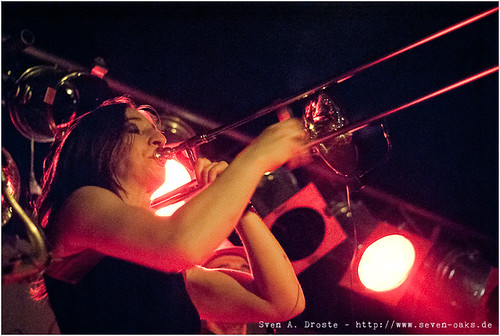
Anke Lucks / Rotfront
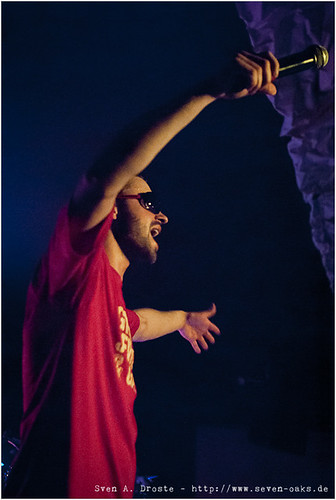
Mad Milian / Rotfront
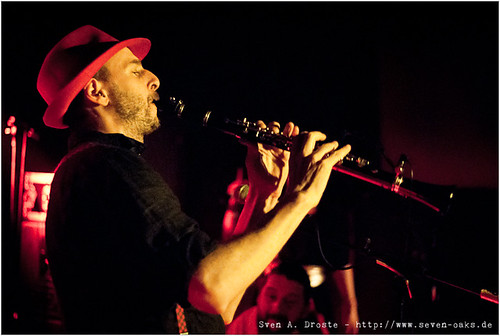
Max Bakshish / Rotfront
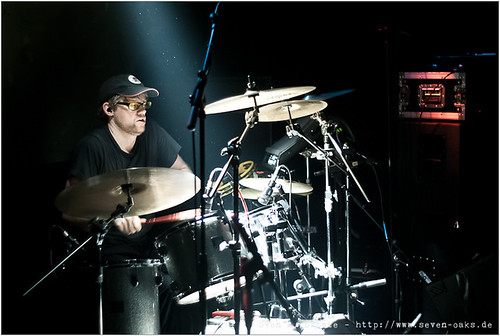
Jan Pfennig / Rotfront
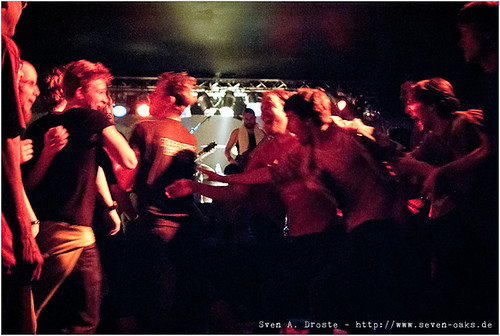
"Wall of Death" / Rotfront
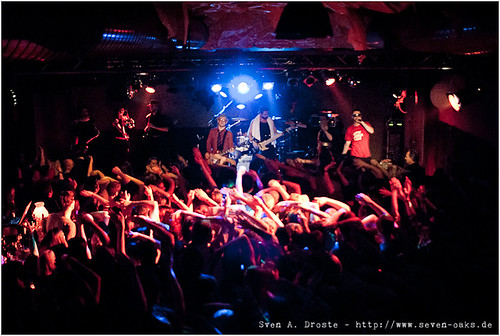
Rotfront & Crowd
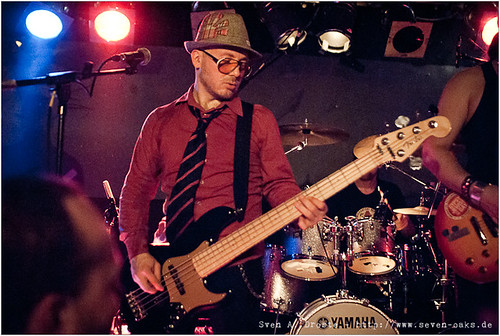
Yuriy Gurzhy / Rotfront
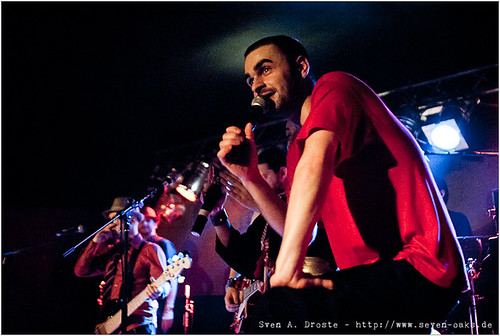
Mad Milian / Rotfront
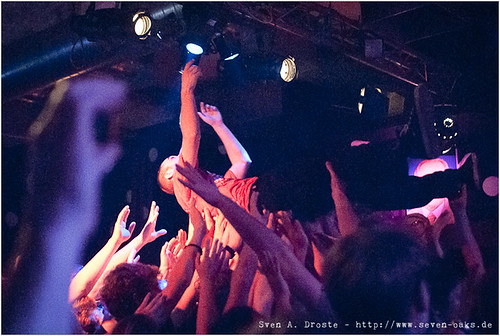
Mad Milian "Crowdsurfing" / Rotfront
Wer jetzt und sofort wissen will, wie es live und mit bewegten Bildern bei einem Rotfront Konzert zugeht, hier ist ein Video zum Record Release.
*= Amazon Affiliate Link. Bei Kauf über diesen Link bekomme ich eine kleine Provision. Der Preis bleibt dabei der reguläre Amazon Preis.
© 2012 by Sven A. Droste | www.seven-oaks.de
YURIY GURZHY: MUSIC CAN’T CHANGE THE WORLD ANYMORE, BUT MIGHT STILL HELP
YURIY GURZHY: MUSIC CAN’T CHANGE THE WORLD ANYMORE, BUT MIGHT STILL HELP
Yuriy Gurzhy is a Ukrainian-born musician and DJ living in Berlin, who won his fame as a founder and a DJ of Russendisko (Russian Disco) as well as the lead singer of RotFront band. His concert at the Klezmer festival in Furth required some re-tuning of the audience, since it was not really a concert, but another thing he is engaged in – a disco. The re-tuning was a piece of cake – the program labeled as Shtetl Superstars – Funky Jewish Sounds From Around the World had everything its name says and makes everyone dance, regardless of one’s age or cultural attribution. Yuriy Gurzhy on cultures, stereotypes, Russian disco and many more.


Ian: Yuriy, could you tell us a bit about the program for today. I’ve read the name ‘Klezmer disco’ and my first obvious association is ‘Russendisko’. Tell us a bit about what are we going to hear today.
Yuriy: Actually I keep on asking the organizers still from the first year of the festival not to label my part as ‘klezmer’. They always say ‘of course’ and keep on writing ‘klezmer’ in their program. So I decided not to pay attention to these conventionalities anymore. The program is going to be bright and diverse. I had this question from the very beginning, a rather rhetorical one, to which I either could not find any answer, of could find a whole bunch of. The question is what Jewish music really is and how can it be defined. In reality, it can be defined however you like and a lot of different musical directions can be classified as Jewish. There is a musicological term saying that it should be music somehow reflecting a certain Jewish experience; directly or indirectly, in music or in lyrics. On the other hand, it should be music written by Jews. In other words, there’s a lot of opportunities for interpretation. So I’m using these opportunities and playing things I just stumble upon. At the same time I have certain musical preferences which always emerge, both in Russendisko and in my own band RotFront. I am attracted by certain genres, certain instruments and try to compile the music set accordingly, so that it is harmonized both for me and the audience and danceable as well. It’s going to be like this today too. Of course, there’s a certain part of klezmer in there, which is even a significant part, but partially it’s really not klezmer, not really klezmer, or maybe even some kind of Israeli hip-hop. Well, may be, but won’t be. Actually classifying music is a dead frost today.
- Especially Jewish music..
- Not really, any music. There’s just good music and maybe bad music, which can still be alright though. So today we are going to have a real blast. The public is really grateful, at least according to the previous experiences here, so I hope on the mutual harmony.- Speaking about Jewish music. Would you call RotFront a Jewish music, and if yes, to which extent?
- This sends you back to the previous answer. Sure: it can be Jewish music, can be Hungarian, or can be Russian/Ukrainian. All these elements are present there. I came from Ukraine, speak Russian and also have a Jewish background. We can be attributed to any culture or style, but I hope there’s no term for this hybrid invented yet. In other words, there’s a certain number of the elements mixed, and as for me, mixed in a rather unique way. So surely, we can be called a Jewish music, especially today, on such occasion. We have songs on different topics, Jewish as well (shows his t-shirt saying ‘Gypsy, Jewish and Gay’).
- That’s actually something I was going to talk about. In this song, ‘Gay, Gypsy and Jew’ there are many bands involved besides RotFront itself, including Ukrainian band ‘Perkalaba’…
- Yes, ‘Perkalaba’ has recorded 42 tracks; I can imagine how happy our producer was having realized he has to work with 42 files for one song, and this is not the end at all…
- Everyone recorded separately?
- Yes, they recorded everything separately and then sent it. They are all based in their own countries and we don’t have any means to gather them all together, like it was done in the video clip ‘We Are The World’.
- There is actually a connection between the two songs. What’s the story behind this one?
- The idea was prompted by the events in Hungary, since we play quite often there. It’s getting really serious when start to you hear about the problems of certain minorities from people which do not belong to them. When minorities consider themselves to be oppressed, it’s still somehow subjective, but when others start to talk about this, something should be done. In Hungary, these three groups precisely are facing such problems. I thought that there are some clear commonalities and this is something I should sing about. I was always trying not to make any direct political statements.
- I didn’t find any political statements in the song.
- True, but it is still the most direct thing I’ve ever done. The song is partially based on Nina Simone’s ‘Young, Gifted and Black’, which has a reggae version as well. The chorus is influenced by ‘Hava Nagila’ and ‘YMCA’ by Village People.
- I was thinking what does the song remind me of…
- See, it reminds you at least of three tunes. I really enjoy putting not really direct, not really obvious quotations, since each of them is disclosing a different layer. It’s clear with Hava Nagila, it’s clear with YMCA as well.
- Indeed.
- I wasn’t trying to invent anything, it all just came by itself. This is a kind of song you sing all together. It sounds well live. Of course, music can’t change the world today anymore, but might still help.
- By the way, why most of your songs, like this one for example, are in English?
- You have probably listened to the new album, since the songs of the first one are mostly in Russian.
- I mean the hits first of all.
- Right. In reality it’s very pragmatic, since for some time we were singing exclusively in Russian, Hungarian and German. Meaning each one was singing in his mother tongue. Finally German remained, Hungarian remained there too, and Russian was put a bit aside, ‘cause I was singing more than all others. At this time we were touring quite successfully, when suddenly I received a phone call from Shantel from Frankfurt. He sent me the instrumental and asked to write the lyrics for it. He wanted it to be in English, and I wasn’t writing in English for a while, only when I was 15 or 16, in times of a terrible decadence in Ukraine, when it sounded appropriate to sing in English. Since then I thought it’s better to sing in one’s native tongue. But when I wrote the song for him, it appeared to be quite easy; it was actually the song ‘Discoboy’ which has its own, legendary fate now. We were singing the song live afterwards. Before that I thought that we have a perfect mutual understanding with the public of going crazy together. At the gig I realized that there is a different level too, that everyone understood everything in English, and our audience is not only Russian or Hungarian. This was a motivation for me to write more in English, to which I almost switched now, though now I write in Russian too sometimes. The main thing is that the audience should understand you.
- When I heard RotFront for the first time, it was the song ‘SovietoBlaster’. It seemed to me to be a sort of banter of all post-Soviet stereotypes…
- There is nothing Soviet in the song itself, and the clip doesn’t have any relation to us. Both clips were produced by a wonderful woman from the USA, Nathalie Lawhead. I’ve never seen her, she just sent us a mail saying that she’s our big fan and would like to make a video clip. I’ve looked through her other works and honestly, by that time I could not imagine how could this be combined with our work. I replied ‘of course, please’; it’s not everyday that people approach you with such offers; she requested the lyrics and in a month sent us the ‘Sovietoblaster’. The first impression was that she’s visualizing each line, but at the same time she’s chosen some weird bearded soldiers from Smolny, while there was nothing like this in the song. She sort of added things. So there was no banter neither in the song itself, nor in the very word ‘sovietoblaster’, a vague definition of some sort of device. Being involved in Russendisko for many years, I’m acquainted with such aesthetics and techniques, this ‘recycling of the past’. From the first moment it seemed to me that she just goes too far. Then I realized that it’s already beyond good and evil. For her it’s not a banter at all, she actually doesn’t know all those Soviet things. She just juggles with some elements she likes, and actually it’s her right and she’s done it in a great way.
- The clip seems to impress even more then the song.
- Indeed, and when she’s heard that there’s a song planned called ‘Gay, Gypsy and Jew’, which wasn’t even recorded by that time yet, she immediately said that she wanted to do the clip. It’s rare that you get to meet such people. The second movie clip is wonderful too, seems like there’s nothing Soviet in it, hopefully.
- There’s a common stereotype that many of Russian emigrants in Germany or elsewhere are constantly fixated to their background and are not really well integrated. Indeed, if you visit a random ‘nostalgic’ Russian store in Berlin, the stereotype is easily proved. At the same time RotFront is showing the bright, diverse side of the emigration culture. How does the artistic perspectives of Russian emigrants look like in general?
- Can’t really say. But for example, I notice more and more Russian authors in German and American literature. The future surely doesn’t belong to those who are fixated. The younger you are, the easier you find it to adjust to the new conditions. As for me, it’s the natural course of events, this is how it should be and this is how it actually happens. I see a lot of talented people coming to live in Germany and it’s great if they are well integrated.
- You are originally from Ukraine. It seem that often Germans, as well as others, don’t see any difference between Russians and Ukrainians and label everyone as ‘Russian’.
- You know, lately I realize more and more that Russian and Ukrainian are totally different people, even though they have a lot in common. I grew up in the USSR, grew up Russian-speaking and still remember the times when one could get exempted from learning Ukrainian for health reasons, just like it was with physical education. I almost don’t have a single Ukrainian-speaking friend. It took time for me to notice the difference in the mentality. The common language unites. Of course, for Germans we all are ‘relatively Russian’. But I think that it’s going to change too.
- You mentioned Russendisko. How did it all began?
- By a simple coincidence, like all the best things. Vladimir invited me to his place and I’ve seen his impressive collection of tapes and LPs. I asked him if I could take some with me. In a couple of days I came back again and we started to exchange and discuss LPs, tapes and books with each other regularly. Once I was there when we have received an offer to organize an event in Tacheles, in the legendary cafe Zapata. This was on the Novemner 7th, Russian Revolution anniversary.
- When was it?
- 11 years ago. Vladimir was a theater director and an actor, but his theater activity was almost in the past by then. So when we have received the offer, his spouse said: ‘guys, why wouldn’t you make a disco if you have so many tapes and disks’. So that was what we did. In reality, it appeared during the disco that our views on dance music were quite different from those of the audience. But from a certain moment everything went smoothly. There were people from Kaffee Burger there, which wasn’t open yet, but was already acquired. They offered us to do such events on the regular basis. That’s how it started. In half-year from then Vladimir Kaminer has published a book of his short stories, and he needed to find the name. The name was on the surface. And it’s already on Wednesday that we’re playing with RotFront on the Russendisko movie premiere, based on his book. It’s a giant German project with a very popular young German actor Mattias Schweighofer playing young Kaminer. It’s being advertised all over Berlin and Germany.
- Seems like Russian emigrant culture is probably even more interesting to Germans then to Russians…
- Actually there’s no connection between the book and the emigrant culture. The book is originally written in German and for Germans. Even though in this book Kaminer writes about Russian, his next one, for example, is dedicated to his journey through the German countryside.
- Still, in TV shows he is always being presented exclusively as ‘Vladimir Kaminer, Russian author’
- ‘True, but he is also often invited to Jewish festival, where he is ‘Vladimir Kaminer, Jewish author’, and when he goes to Russia, they offer him an interpreter and announce him as a ‘German writer’. I don’t care about such things anymore. Once I was always correcting others, like ‘we are this, and not this by any means’, or ‘this one is good, but this is not what we are’. Whatever. Let it be any culture, even African. There might be actually some connections with this one, by the way.
Subscribe to:
Posts (Atom)

